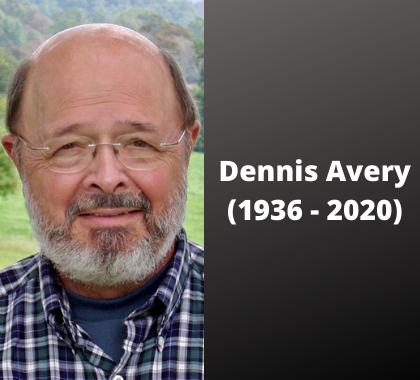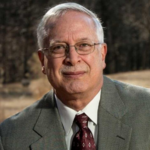Subscribe here.
This issue of Climate Change Weekly presents a memorial to Dennis Avery, who passed away on June 20. The thoughts below, by those at The Heartland Institute who knew him best, show his impact on our lives and his influence on agricultural and climate research and policy, an impact that will continue long after Dennis is gone.
It is with no small amount of sadness that I learned Dennis Avery had passed away. I had known Dennis going on 20 years, going back to my time as a senior fellow at the National Center for Policy Analysis (NCPA) when I first began to investigate biotechnology and its potential to feed the world’s growing population while minimizing environmental harm. I learned a great deal from Dennis writings on this topic, which ultimately served as a basis for some of my own work in the field, including the study “Biotech versus Precaution in Europe and America: Killing the Golden Goose.”
Dennis and I began to correspond first via e-mail and then in discussions over the phone, becoming friends as well as colleagues. I found him to be both a gentleman and a scholar. By the end of every conversation or exchange I had with Dennis, I had always learned something new and important. Dennis was always complimentary of my work and seemed genuinely glad to hear from me each time we spoke.
Our working relationship led Dennis to request that NCPA publish a short version of his and S. Fred Singer’s then-unpublished manuscript, “Unstoppable Global Warming: Every 1,500 Years.” John Goodman, president and founder of the NCPA, readily agreed and charged me with editing the document to NCPA’s standards and style. The result was a policy report on “The Physical Evidence of Earth’s Unstoppable 1,500-Year Climate Cycle,” a work of which I remain proud of having had a hand in producing.
After I joined The Heartland Institute, Dennis remained a go-to-guy on agricultural matters, and though we did not correspond as often as in the past, I enjoyed seeing him at multiple International Climate Change Conferences. Most recently, I conducted a podcast with Dennis in 2019, discussing one of Dennis’s favorite topics, “Feeding the World’s Poor and Restoring Wildlife Habitat.”
Dennis, I will miss you!
— H. Sterling Burnett
SOURCES: National Center for Policy Analysis; National Center for Policy Analysis; International Conference on Climate Change; The Heartland Institute
IN THIS ISSUE …
S. T. KARNICK: DENNIS AVERY: FRIEND, HUMANITARIAN, THOUGHT LEADER … JOE BAST: DENNIS AVERY, R.I.P. … PAUL DRIESSEN: ANOTHER GIANT OF SCIENCE HAS PASSED
S. T. KARNICK: DENNIS AVERY: FRIEND, HUMANITARIAN, THOUGHT LEADER
The following essay presents a personal perspective on Dennis Avery from S. T. Karnick, The Heartland Institute’s director of publications, who was closest to Dennis among Heartland’s staff.
Dennis T. Avery, who died last week at the age of 83, was a personal friend of mine, a great ally of The Heartland Institute, and a superb analyst and writer about environmental issues, especially global food production. Avery studied every element of the issue, from population dynamics and demographics to the science of plant growth, and his writings and speeches combined the wisdom of the generalist with the analytic skill of the specialist.
Avery had a thorough understanding of both agriculture and economics. He grew up on a farm in Michigan and studied agricultural economics at Michigan State University and the University of Wisconsin. He served as senior agricultural analyst for the U.S. Department of State and then went on to become director of the Hudson Institute’s Center for Global Food issues, where he spent many years leading the charge for the application of scientific and economic knowledge to agriculture and environmental policy. He had previously served on President Lyndon Johnson’s National Advisory Commission on Food and Fiber, writing the commission’s landmark report, “Food and Fiber for the Future.”
Avery understood that the imposition of wide-ranging, transformative government policies, the stock in trade of the environmental movement, affects everything, and that human thriving requires first and foremost the production of a food surplus beyond what is necessary for survival. Avery also understood that people will do whatever they can to ensure that they have reliable supplies of food, water, and cooking and heating fuel—something the overfed American public and the people of the other developed nations tend to forget. That means that producing food and other agriculture and forestry products more efficiently saves the environment.
Avery’s great insight was that people simply must be fed, and they will destroy the environment if the alternative is famine. In addition, Avery recognized that a rapid increase in human population growth was inevitable because of improvements in disease mitigation, public and private sanitation, and the like. The big question was not whether we could stop the population increase, which we could not (and did not, despite great efforts to do so), but whether we could feed the rapidly rising population.
It turned out that we could in fact feed the world, through modern farming and breeding techniques that led to incredibly rapid increases in agricultural productivity. Avery was a disciple of the Nobel Prize-winning agronomist Norman Borlaug, who was responsible for the “Green Revolution,” the use of science and technology to increase crop yields. While eco-pessimists such as Paul Ehrlich (The Population Bomb) and the Club of Rome (The Limits to Growth) predicted mass starvation and called for worldwide population “control,” Borlaug experimented with plant breeding to foster disease resistance and higher yield capacities and greater amounts of nutrients within the crops. Combined with advances in the use of pesticides, herbicides, and mechanization, Borlaug’s innovations in plant breeding are estimated to have saved up to a billion people from starvation.
Avery took the same pragmatic, scientific approach to all environmental issues, always searching for the best option in the circumstances, never assuming that national or global governmental coercion could prevent people from wanting to better their lot in life even if the world’s population was growing rapidly. Famines, Avery observed, were caused largely by natural disasters and politics—wars and greed—not an overall lack of food. The key was to get the food to those people whose governments were dooming them to starvation.
Avery’s brand of pragmatic, scientific optimism suffused his first big book, Saving the Planet with Pesticides and Plastic: The Environmental Triumph of High-Yield Farming (2000), which I had the privilege of helping him pull together from a large box of diverse manuscripts full of detailed scientific, demographic, and economic observations held in place by the perfectly Dennis Avery observation characterized in the book’s title. (I don’t think we ever considered any other name for it.) Seven years later, Avery and Fred Singer would publish Unstoppable Global Warming—Every 1,500 Years, which argued that the Earth’s temperature is determined by natural cycles and that attempts to control the planet’s temperature are doomed to fail. The good news, the two men always made clear, is that humans can easily adapt to the warmer world, and in fact a slightly warmer climate is good for people.
Working with Dennis at Hudson Institute and later at The Heartland Institute was simply a joy. His optimism and love of science were infectious, and he delighted in applying each to the other. I vividly remember Dennis walking up to me at our offices in the Hudson Institute in the 1990s and saying, “The global warming movement is going to become really desperate in the next few years. The number of sunspots has dropped to almost nothing, and the Sun is going into a phase of lower output. The Earth’s temperature is going to stop increasing, and the global warming movement is going to have no way to explain the absence of the radical temperature increases they have been predicting.”
Sure enough, Dennis was right. There was a well-documented hiatus in global warming between 1998 and 2013, and the global warming activists had such a hard time explaining it that they dropped the term “global warming” in favor of the catch-all, tautological term “climate change.” Dennis regularly dropped insights like that into our conversations, and he seemed always to have a big smile and an easy manner. I ran into him at a Heartland Institute climate conference one time, and he was wearing an ascot. I must admit that I was a bit envious that he could make that work. We ended up talking for quite some time, as was always the case when we found ourselves thrown together in the wild and wooly world of American think tanks.
Our phone conversations generally started with a good, long discussion of football and basketball, especially the Big Ten—Dennis was an enthusiastic fan of Michigan State and the University of Maryland. I graduated from the University of Illinois, so he always had much more happy news to report, and he was invariably encouraging about my school’s prospects—which shows you exactly how polite and kindhearted he was, if you know anything about University of Illinois sports.
In recent years, Dennis had been working diligently on a book about how climate change has affected the rise and fall of civilizations over the millennia. He finished it a couple of years ago, and it is a very interesting and insightful piece of scholarship that could inspire much useful further knowledge. If you know of a publisher who would be interested in giving it a look, please contact me at The Heartland Institute, and I’ll pass the word to Dennis’s widow, Anne, and his son, Alex. It would be a fitting capstone to the career of a brilliant thinker, a true lover of humanity, and a precious friend.
— S.T. Karnick
JOE BAST: DENNIS AVERY, R.I.P.
Below are the thoughts of Joe Bast, longtime president of the Heartland Institute, on Dennis Avery’s life and impact.
The world became a less interesting place on June 20, 2020 with the passing of Dennis Avery, a gifted scholar and communicator best known for his work on agriculture, energy policy, and climate change. He was 83.
Dennis was probably best known for two provocative books. The first, titled Saving the World with Pesticides and Plastic (Hudson Institute 1995, second edition 2000) debunked dozens of liberal shibboleths about agriculture, food safety, and public health. The book anticipated and helped spark the rise of a generation of researchers and writers willing to challenge the faulty science and economics behind many popular but misguided environmental protection campaigns. The second book, Unstoppable Global Warming—Every 1,500 Years (Rowman & Littlefield, 2007, second edition 2008), coauthored with S. Fred Singer, quickly became the Bible of the fast-growing “global warming skeptics” movement.
In an age when angry exchanges between partisans get much more attention than scholarship and debate, Dennis Avery maintained a dignified but not silent presence, a true “gentleman and scholar” willing to calmly and patiently explain complex issues even as others try to shout down opposing views. He was a frequent speaker at the climate change conferences hosted by The Heartland Institute (available on YouTube), contributed to the Climate Change Reconsidered series produced by the Nongovernmental International Panel on Climate Change (NIPCC), and traveled to Katowice, Poland to join other scholars in presenting contrary opinions on climate change at the United Nations’ 24th Conference of the Parties (COP-24).
Dennis was much admired and beloved by his countless colleagues and friends around the world. He will be sorely missed.
Learn more about Dennis Avery at this site for him at Heartland.org.
— Joe Bast
PAUL DRIESSEN: ANOTHER GIANT OF SCIENCE HAS PASSED
Another giant of science, history and scholarship has left our world. Dennis T. Avery died June 21 at age 83. With the passing of this “gifted scholar and communicator, the world became a less interesting place,” former Heartland Institute president and CEO Joe Bast commented.
Avery’s career was indeed remarkable for its breadth and depth. Born in 1936 in Lansing, Michigan, he earned degrees in journalism and economics from Michigan State University and the University of Wisconsin, then worked for a variety of federal government agencies before retiring in 1989 as Senior Agricultural Analyst for the U.S. State Department. Among his many other awards and honors, he received the National Intelligence Medal of Achievement in 1983.
After moving to northwestern Virginia in 1990, he launched the Center for Global Food Issues and began his international consulting, lecturing and writing career. His farming operations practiced no-till agriculture, which utilizes biotech seeds and herbicides to help preserve soil structure and organisms, moisture, organic matter and nutrients, thereby improving drainage and soil biodiversity, while reducing erosion. Avery practiced and studied what he wrote about in his books and articles.
His 1995 book Saving the Planet with Pesticides and Plastic: The Environmental Triumph of High-Yield Farming was used in classrooms throughout the world. His 2007 New York Times bestseller, Unstoppable Global Warming: Every 1500 Years (coauthored by S. Fred Singer) became “the Bible of the fast-growing ‘global warming skeptics’ movement,” Bast said. (Dr. Singer died in April 2020 at 95.) Avery’s last manuscript, Climate and Collapse, will be published posthumously.
For many years he monitored developments in world food production, farm product demand, the safety and security of food supplies, and the sustainability of world agriculture. As a staff member of the President’s National Advisory Commission on Food and Fiber, he wrote the Commission’s landmark report, Food and Fiber for the Future. He traveled widely as a speaker, testified before Congress, appeared on many radio and television news programs, and was often quoted in publications like Time magazine, The Washington Post and The Farm Journal.
Dennis was a frequent speaker at climate change conferences hosted by The Heartland Institute (available on YouTube), contributed to the Climate Change Reconsidered series produced by the Nongovernmental International Panel on Climate Change (NIPCC), and traveled to Katowice, Poland to join other scholars in presenting contrarian, real-world opinions on climate change at the United Nations 24th Conference of the Parties (COP-24) in December 2018.
Countless people read his informative and entertaining articles on energy, environmental and agricultural issues, and on climate changes throughout history, as warmer periods helped civilizations to flourish, while little ice ages and droughts caused many to disappear.
I was honored to edit and distribute some of his columns, and delighted to hoist occasional beers with him while we discussed these topics and the sad decline of civil, civilized discourse and debate over them in recent years. As Joe Bast observed, “In an age when angry exchanges between partisans get much more attention than scholarship and debate, Dennis maintained a dignified but not silent presence. He was a true gentleman and scholar, willing to calmly and patiently explain complex issues, even as others tried to shout down or cancel opposing views” – or even prosecute and jail anyone presenting those views.
My family and I spent a glorious day on his farm, feeding and enjoying the animals, savoring a delicious dinner prepared by his delightful wife and Center for Global Food Issues associate Anne, and chatting on into the night about multiple topics. His friends remember him as “inquisitive, articulate, energetic, humble and well informed” – as much as for his “ready smile and quick dry wit.” Dennis was admired and loved by his family and his many colleagues and friends around the United States and world. He revered history and conducted lengthy, painstaking research in search of the truth on every topic he addressed, even when truth was uncomfortable.
Dennis is survived by his wife Anne, sons Adam and Alex, daughter Amy, stepson Kevin, brother Lawrence, sister Carol, and five grandchildren. A celebration of his life will be held at a later date. Memorials may be given to Covenant Presbyterian Church (2001 North Coalter Street, Staunton, VA 24401) or a charity of choice in his name.
We will all miss him, but his amazing legacy will live on.
— Paul Driessen









